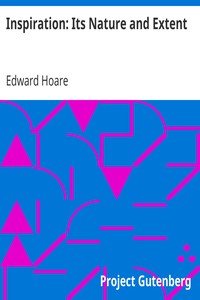| Summary |
"Inspiration: Its Nature and Extent" by Edward Hoare is a theological treatise written in the late 19th century. This book explores the complex relationship between the divine and human elements of scriptural inspiration, aiming to clarify the concept of inspiration as it pertains to the Bible. Hoare, a vicar and honorary canon, approaches this subject with an emphasis on the importance of understanding the nature and extent of divine communication through scripture, asserting its significance for the Christian faith. In this work, Hoare presents a detailed examination of inspiration, dividing it into two primary components: the divine element, where he argues for the infallibility and authority of Scripture inspired by the Holy Spirit, and the human element, which recognizes the individuality and unique characteristics of the writers. He outlines various challenges to the doctrine of inspiration, addressing issues such as the coexistence of human intellect and divine guidance. Throughout the book, Hoare defends the idea that true inspiration encompasses both the thoughts and the words of the scriptures, while also tackling common objections related to scientific accuracy and historical discrepancies. By the conclusion, he emphasizes that both human and divine elements are harmoniously infused in Scripture, affirming it as the authoritative word of God. (This is an automatically generated summary.)
|

